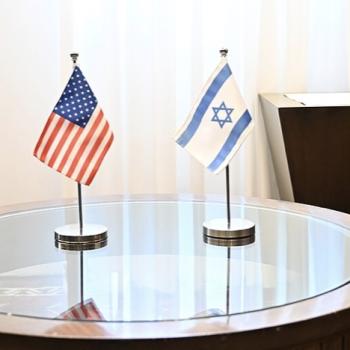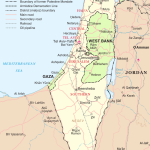The vice-president of the International Court of Justice said, ‘The Lord is counting on me to stand on the side of Israel.’ How did we get here?
The trial: South Africa v. Israel
Julia Sebutinde, Ugandan and vice-president of the International Court of Justice (ICJ), was the only judge on a 17-member ICJ panel who voted against all six measures in the ruling in January 2024 that Israel is “plausibly” committing genocide in Gaza. Even the Israeli judge on the panel voted in favor of some of the measures.
Uganda’s permanent representative to the UN, Adonia Ayebare, posted on X in response, “Justice Sebutinde’s ruling at the ICJ does not represent the Government of Uganda’s position on the situation in Palestine. Uganda’s support for the plight of the Palestinian people has been expressed through our voting pattern at the UN.”
A few months later, Sebutinde was again the only member of a 15-judge panel who voted No on all measures that Israel’s decades-long occupation of the Palestinian territories was “unlawful”. (Later, she apparently plagiarized at lease 32 percent of her dissenting opinion on the subject.)
Sebutinde’s official explanation for genocide dissent
Justice Sebutinde wrote in her dissenting opinion that “both Israel and Palestine” have failed to uphold humanitarian law, and the “tragic situation [of conflict between the two sides] can be brought to an end only through implementation in good faith of all relevant Security Council resolutions.” [NOTE: The United Nations has passed at least 700 resolutions critical of Israel’s actions – many of which have been repeated year after year, as Israel has refused to comply.]
This is an interesting take, and highly problematic, given that Israel’s failure to uphold humanitarian law is drastically higher than Palestine’s; that the situation is is many orders of magnitude more “tragic” for the people of Palestine than those of Israel; and perhaps most of all because it is impossible for Israel to implement Security Council resolutions while violating them against the people of Gaza, and for the Palestinians to implement them while being subject to a genocide.
Justice Sebutinde dismissed South Africa’s accusation of Israel’s “genocidal intent” – and the hundreds of pages of meticulously documented quotes by Israeli leaders presented as evidence – by repeating Israel’s own argument, that every one of the statements had been taken out of context, and actually referred to Hamas.
Next, she claimed that the war was started by Hamas on October 7, 2023 – implying that the conflict began on October 7th, 2023 when Hamas fighters attacked Israel for no reason. In fact, Israel has been oppressing Palestinians since its creation in 1948, and even before that.
She also insisted that Israel attacked only legitimate military targets (false), mitigated civilian harm by warning residents before attacks (false), and facilitated humanitarian assistance (false).
Justice Sebutinde then seems to then criticize the Genocide Convention for being at times too vague, and at other times too redundant.
She went on to specifically condemn the ICJ’s demand that Israel “take immediate and effective measures to enable the provision of urgently needed basic services and humanitarian assistance” to the Palestinian people in Gaza. Her reason: under the Genocide Convention, “a State party has no duty to provide or to enable the provision of, humanitarian assistance, as such. There may be an equivalent duty under IHL [International Humanitarian Law] but not the Genocide Convention.”
This is an extraordinary statement: yes, Israel has an obligation to make sure Gazans don’t starve to death – but it’s under a different set of rules than the ones we are litigating here, so starve away.
Bottom line: Justice Sebutinde, a member of one of the top courts in the world, had an opportunity to interrupt a genocide in progress, and she did not.
In her dissenting opinion, Judge Julia Sebutinde made a weak argument for Israel, but at least she cited precedents, quoted statutes, and appealed to historic documents.
It gets even worse – way worse
More recently, however, she explained the real reason behind her dispute with the rest of the panel: “God is counting on me to stand on the side of Israel.”
You read that right.
Last week, Justice Seubtinde spoke publicly in her home country of Uganda, at the Watoto Church – which appears to be a Pentecostal megachurch.
“There are now about 30 countries against Israel,” she explained, referring to the states that have declared their support for the South African case. “The Lord is counting on me to stand on the side of Israel.”
“There is something I want to share. I have a very strong conviction that we are in the End Times. The signs are being shown in the Middle East. I want to be on the right side of history. I am convinced that time is running out. I would encourage you to follow developments in Israel. I am humbled that God has allowed me to be part of the last days.”
We don’t know precisely what she meant here, but one thing we do know is that Jesus would never stand for the starvation of children. Justice Sebutinde would, and that’s how we can be sure she is dead wrong.
Are we in the last days? Maybe, but we can’t be sure.
Are the events in the Middle East the fulfillment of prophecy? We can’t be sure.
What can we be sure about? That Jesus would not tolerate the intentional starvation of children, or the bombing and sniping of innocent people. Jesus would not tolerate his followers standing with murderers or liars.
Justice Sebutinde is a brilliant woman and attorney. She is likely not purposely cozying up to genocidaires. She believes she is defending God’s chosen people, that she is helping pave the way for the triumphant return of Christ.
Justice Sebutinde is the reason why we must do more than listen to preachers.
It’s dangerous – deadly – to just listen to preachers and not think for ourselves, to just listen to preachers and not hold their words up to the light of Jesus’ life and teachings.
Look at Sebutinde and her position of immense power. She has risen to a place where she has a voice (theoretically, at least) in calling forth justice on a global scale. She has used her privilege recklessly, contributing to the deaths of innocent Gazan children – and she did it in the name of our Savior.
We have to examine our belief system. Every bit of it.
It doesn’t matter how long you’ve held to a tenet of your faith. If it’s wrong, you have to walk away from it.
It doesn’t matter that there’s a Bible verse telling you to “bless Abraham” (Genesis 12:3). Don’t use that as an excuse to encourage the deaths of innocent people. Think. It. Through. (BTW, my Muslim Palestinian husband would want me to remind you here that Abraham was not even Jewish. Look it up.)
Wherever you are on the continuum of power and influence, you have a responsibility to scrutinize your beliefs. We can not assume that what we were taught is truly Scriptural just because it seems to be.
(In case you’re interested, the Arab Organization for Human Rights in the UK (AOHR UK) is calling for the removal of Judge Sebutinde, because this stunt of hers breached Articles 2 and 18 of the Court’s Statute.
Article 2 of the Court’s Statute requires judges to display integrity, impartiality, and independence. Should any of these conditions be breached, Article 18 provides that the judge concerned must be removed with the consent of the other Members of the Court.
The AOHR UK added that Judge Sebutinde has not only abandoned impartiality and integrity but has also expressed messianic religious ideas that encourage the perpetuation of the crime of genocide, which has already claimed tens of thousands of victims, the majority of whom are women, children, and the elderly.)
I invite you to subscribe to my newsletter. I write about Palestine and Israel, and other issues relevant to progressives or those considering becoming progressive (whenever I have time!). If you would like to comment on this post, please pop over to my Facebook page. All of my posts are there and open to constructive comment. I welcome your thoughts.
RELATED POSTS:
- This is the truth about “there is no famine in Gaza”
- Why as a Christian, I won’t be condemning Hamas anytime soon
- The Palestinians’ ironclad, inalienable right to resist
- Israel, the ICC, and the disintegration of our species
Featured image: Justice Julia Sebutinde, screengrab














